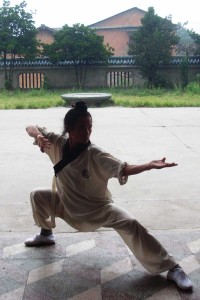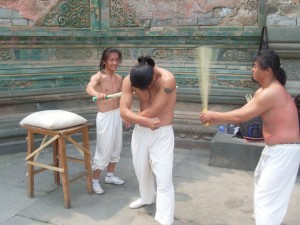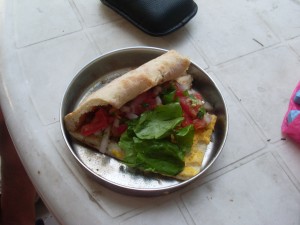 As you may have seen in movies, the Kungfu community here has a family and generational structure. Our master would be the father figure (Shifu), his master is the grandfather figure (Shiye), anyone who studied under our master’s master would be our aunt or uncle (Shushu), and anyone who studies under our master is our brother or sister. Brothers are further divided into older and younger, those who started studying before you (Shixiong), or those who started after (Shidi). Respect flows up this structure, as you might expect. So in my bumbling foreign way, I try to show respect to those above me and do what they say.
As you may have seen in movies, the Kungfu community here has a family and generational structure. Our master would be the father figure (Shifu), his master is the grandfather figure (Shiye), anyone who studied under our master’s master would be our aunt or uncle (Shushu), and anyone who studies under our master is our brother or sister. Brothers are further divided into older and younger, those who started studying before you (Shixiong), or those who started after (Shidi). Respect flows up this structure, as you might expect. So in my bumbling foreign way, I try to show respect to those above me and do what they say.
I am becoming more and more aware of the strange ways this structure juxtaposes with other issues in my life here, specifically in my interactions with my older kungfu brothers who are younger than me in age. I owe them respect, both because of tradition and because they are very skillful teachers. Further, they are at home in this culture and I look to them for guidance in how I conduct myself. So I frequently find myself imitating them almost unconsciously. Oh, that’s how I should do that stance. Oh, that’s what I do when Shiye visits.
Seeing them as role models in these ways sometimes blinds me as to their actual age, and I find myself imitating pretty immature behavior. Because in addition to kungfu teachers and Chinese natives, they are also 15-18 year old kids going through all the same bewildering stuff I went through not all that long ago. They are learning what professionalism means, what accountability means, learning about relationships, and learning about the world beyond the walls of the kungfu school and beyond the borders of China.
So I find myself in the strange situation of having to sometimes be a role model for my role models. It is difficult, because one frequently forgets if one should be learning or teaching at a given moment. Two people teaching each other at the same instant tends to devolve into an argument, and sometimes two learners becomes a case of the blind leading the blind. In truth, more often than not we all fall down and all behave like children, but I hope that in some ways I am having a good impact on them even as I learn from them.


